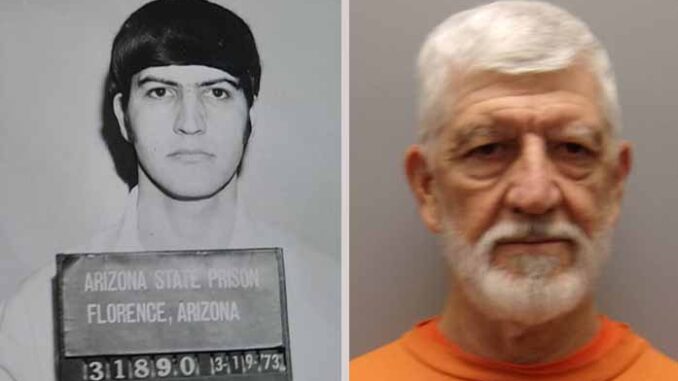
A man convicted 50 years ago of an extremely brutal and random murder had his bid for a new trial rejected Monday after he unsuccessfully argued the insanity defense put forth during his 1973 trial involved now-discredited junk science.
Corey Axon Karstetter was a security guard at Mesa Community College in October 1972 when he confessed to police investigators that he punched, kicked, strangled, and sexually assaulted a female employee before placing the body in the woman’s vehicle.
Karstetter, then 27, was convicted by a Maricopa County jury of first-degree murder after jurors rejected testimony from a psychologist and a psychiatrist that Karstetter was temporarily insane during the 20 minutes it took to commit the attack.
Karstetter was sentenced to natural life in prison, with the Arizona Court of Appeals upholding the conviction and sentence in 1974. Court records show he did not attempt to challenge his conviction again until 1997; that effort was denied by a Maricopa County judge.
Then in 2022, Karstetter filed another petition for post-conviction relief in Maricopa County Superior Court. He raised several claims, including newly discovered evidence.
That new evidence, according to Karstetter, was information suggesting the diagnosis underlying his 1973 claim of temporary insanity would not be accepted today as scientifically sound. This resulted in his defense attorney relying at trial on expert testimony now considered “flawed,” or what is often referred to as junk science.
Karstetter’s also claimed his trial attorney was ineffective 50 years ago by pursuing the temporary insanity defense instead of arguing Karstetter’s actions made him guilty only of second-degree murder.
Those post-conviction claims were rejected by a Maricopa County judge earlier this year, prompting Karstetter to seek review by the Court of Appeals. A three-judge appellate panel issued its unanimous decision on July 10.
“To make a colorable claim of newly discovered evidence, Karstetter must identify relevant evidence that existed at the time of trial but could not be discovered until after trial and provide sufficient facts for the trial court to conclude he was diligent in discovering that evidence,” wrote Judge Lacey Stover Gard in the decision.
Equally important, Gard noted, is that Karstetter had to establish the evidence would likely have changed the verdict if known at the time of trial.
“He has cited no authority, and we find none, suggesting that a claim of newly discovered evidence may rest on a defendant’s discovery that an expert’s opinion supporting his defense had later been debunked,” Gard wrote. “Karstetter has not explained how subsequent scientific advancements that call into question his unsuccessful defense theory could create some defect in his trial.”
The decision, in which Presiding Judge Karl Eppich and Chief Judge Garye Vasquez concurred, further notes Karstetter’s petition failed to establish any likelihood that the jury would have voted for second-degree murder instead of first-degree.
Gard noted it is “undisputed that Karstetter severely beat the victim and then strangled her, resulting in her death.” Under Arizona case law, such a “protracted, brutal, and . . . sustained” attack on a victim is evidence of premeditation, one element jurors can rely on for convicting on a first-degree murder charge.
A separate option for jurors to convict on first-degree murder is to find beyond a reasonable doubt that Karstetter committed rape or attempted rape as part of the attack that killed the victim.
The 1974 court of appeals decision in Karstetter’s case shows jurors heard uncontradicted evidence that Karstetter “freely confessed” to engaging in the deadly attack when he made a post-Miranda statement to police. No specific reason or motive was provided for why the victim was targeted.
Karstetter did not testify at trial. Instead, his defense attorney called the two mental health experts who testified Karstetter was sane up until the moment he first struck the victim during some type of mental “explosion” that occurred due to “frustrations and antagonisms” which beset the defendant.
Once the 15 to 20 minute attack was over, it was the experts’ testimony that Karstetter was sane again.
Court documents show it is unknown whether the jury’s first-degree murder conviction was based on premeditation, on death during commission of a sexual offense, or both.
